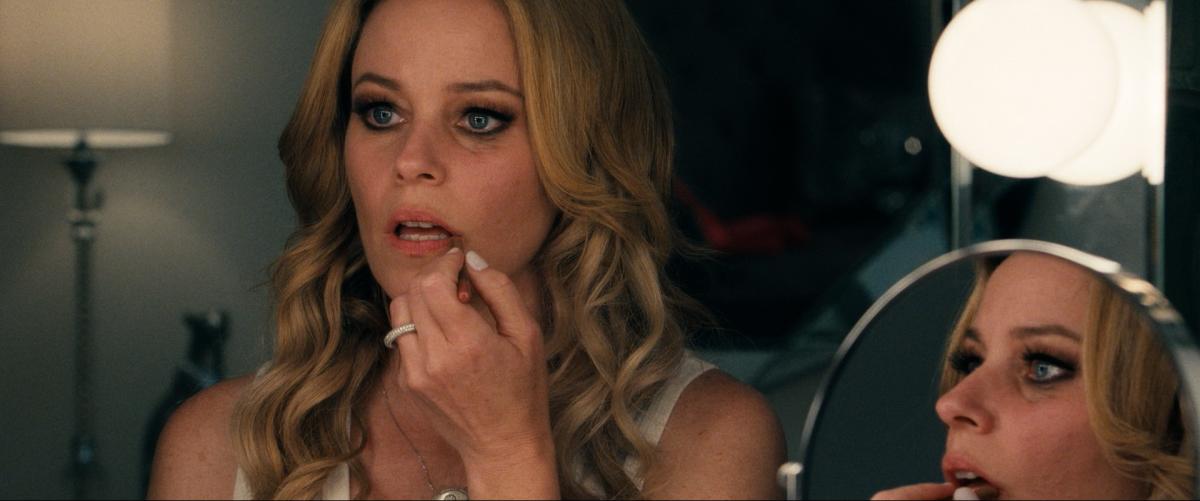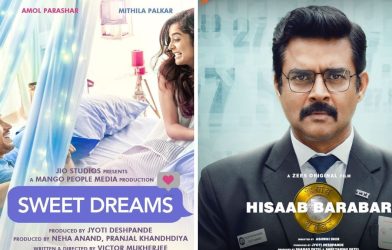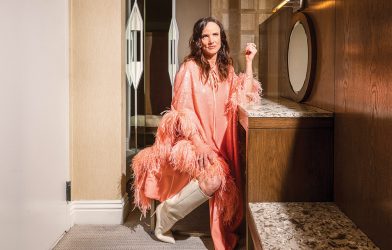After directing music videos with famed artists like Orville Peck, Haim and Bastille, and moving on to the documentary Give Me Future about Major Lazer’s free concert in Cuba in 2016, Austin Peters has now stepped into narrative feature filmmaking. His star-studded first venture is Skincare with Elizabeth Banks (in theatres August 16).
Banks plays Hope Goldman, a Los Angeles-based celebrity facialist who’s launching her own skincare line. But while she’s navigating the financial investment to start her own line, alongside her high-profile practice, a rival aesthetician, Angel Vergara (Luis Gerardo Méndez), sets up shop across the street from Hope’s studio.
Just as Hope starts to worry about Angel possibly impacting her business, she’s convinced someone is trying to sabotage her after a series of unfortunate events, including Hope’s email being hacked with embarrassing messages sent from the account. Hope’s friend Jordan (Lewis Pullman) helps her try to figure out who is trying to ruin the business and, more importantly, her reputation.
For Peters, Banks was always the top choice for the film’s lead actor.
“She was our first choice and we thought it was such a long shot that she would do it,” Peters told Yahoo Canada. “Getting to see her bring this character to life and seeing what she adds to it, and seeing her choices that she makes when we would talk about the script, but then also on the day the things that she would find, was so exciting.”
“The schedule was incredibly intense, as it is for all independent films, and the days were super long, as they are for all independent films, but I would come home so energized and so excited, because it was just thrilling to watch her bring this character to life.”
Banks also reunites with her Slither co-star Nathan Fillion in Skincare. Fillion plays a sleazy TV host and Hope goes on his show to promote her skincare line.
“He was always so funny and he was always so on it,” Peters said. “He and Elizabeth have been friends for a really long time.”
“He didn’t work very many days and he showed up and just clicked in, and they immediately have this shorthand, and they were able to have so much fun. … He just was unbelievable and was cracking everybody up. … I have so many hours of footage of him behind the TV desk where he’s making up different news stories that they’re cutting to. … It was hard to cut anything because it’s just all so great.”
While Skincare is very loosely inspired by the story Dawn DaLuise, the Hollywood aesthetician who was arrested and then acquitted in a murder-for-hire plot, Peters stressed that this film is “totally fictional.”
“We made a very conscious decision early on to not try and tell that story, not trying to serve that story, because we didn’t want to make a documentary or a piece of journalism, we wanted to make it a sunshine noir set in Hollywood in 2013,” Peters said.
“It was inspired by the loose idea of this case that happened, … and we’d heard these stories, but I think that everything beyond that was about, what is the best version of this movie. … How did this fit into this idea of the sunshine noir, and the characters are completely inventions of the cast and of the writers.”
Moving away from ‘glamorized’ version of Los Angeles
Aside from the film’s famous stars, the setting for Skincare has its own style.
While historically Los Angeles and Hollywood-set stories have been shown as this bright, glitzy place, Peters’ approach to Skincare takes a much grittier and dark look at the film’s location.
“We went to lengths to figure out a way to shoot this movie in L.A., which was not the cheapest option, … because we really wanted it to feel like L.A. and like Hollywood as an actual city,” Peters explained. “Not as this Emperor’s New Clothes kind of situation where … it wasn’t this glamorized version that you see on reality shows that are set here.”
“We talked a lot about American movies from the 1970s, a lot of which are shot in New York City, and it feels like New York, and it feels like this almost documentary kind of version of that. And so we wanted to capture that same spirit. … It’s really L.A. It’s not just this fake Hollywood that I think, when you say Hollywood to people all over the world, sometimes they have a certain idea that pops into their head. It’s the movie business and it’s glamour and it’s wealth, and it’s all these things. And we really wanted this movie to show Hollywood the location and Hollywood the city, and an actual 10-block radius that this movie takes place in, and really feel grounded in that space.”
As you may expect with Peters’ extensive experience directing music videos, the music and the score in Skincare feel very specific, but there was actually a time when the filmmaker thought there wouldn’t be any music in the film.
“There was an early iteration of this movie where I thought I was going to make it with no music, and it was all just going to be live, natural sound and sounds of the city,” Peters revealed. “But then I had the realization that while … there’s lots of movies that I enjoy like that, that’s not necessarily what I do and it would be a disservice to … not try and have that music in this movie.”
“I think that I always knew that there was going to be some of the heavy kind of metal music in it, and I always knew that there was going to be top 40 pop music in it, or that was always my aspiration. I always knew that I wanted the score to … be something that created an atmosphere for it that felt really different.”
Peters was particularly inspired by the score of the 2019 film Atlantics, led by Fatima Al Qadiri, who worked on the score for Skincare as well.
‘The pursuit of the image of success’
At the core of Skincare is story about someone’s quest for fame and success, how far they’ll go to achieve it and what happens when their idealized success story is in jeopardy.
“It’s a real heightened version of something that we can all identify with now, which is trying to get by and trying to be successful, and trying to make it in an economy that’s very challenging,” Peters said. “Trying to to pay our bills and try to be successful, and try to not be replaced by the younger generation that’s coming up behind us that is different and knows how to use TikTok, and knows how to do these things that maybe we don’t.”
“We talk so much about the movie being about the image of success and the pursuit of the image of success, and how far you’re willing to go to protect your image, and how important the image of success is versus even real success. I think that the fame version of that is sort of the bizarro fun house version that you get to experience in L.A., where it feels like everything is so heightened and everything is so cranked all the time, which makes it an exciting setting for a movie or for discourse about culture. Because everything here does feel so elevated all the time.”









